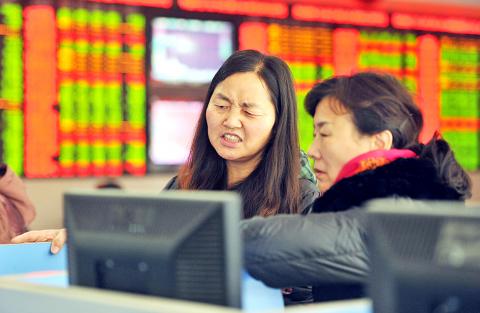Shares in Taiwan closed in negative territory on the first trading day of the new year, pulled down by a fall on Wall Street at the end of last week and cautious sentiment ahead of the Jan. 16 presidential and legislative elections, dealers said.
The market was also caught in a downward spiral seen around Asia, triggered by a heavy sell-off in China that forced the suspension of trading in Shanghai.
The TAIEX closed down 223.80 points, or 2.68 percent, at 8,114.26, after moving between 8,109.09 and 8,326.33. Turnover totaled a relatively low NT$76 billion (US$2.29 billion) during the session.

Photo: AFP
It was the biggest fall on the first trading day of a new year on the Taiwan Stock Exchange since 1999.
Hua Nan Securities Co (華南永昌投顧) chairman David Chu (儲祥生) said the sell-off followed a 1.02 percent drop in the Dow Jones Industrial Average in the US on Thursday last week.
Many investors are staying on the sidelines ahead of the elections, given the uncertainties in the market, he said.
The abolishment of the capital gains tax on profits from trading stocks, which was passed by the Legislative Yuan in November last year and took effect yesterday, led to heavy selling of several stocks that went public last year.
OBI Pharma Inc (浩鼎), the most expensive stock in the biotech sector, which rose from its listing price of NT$310 per share in March last year to its recent level of more than NT$600, closed 7.2 percent lower at NT$608.
Financial stocks dropped 3.52 percent yesterday.
In China, the worst-ever start to a year triggered a trading halt in more than US$7 trillion of equities, futures and options, putting the nation’s new market circuit breakers to the test on their first day.
Trading was halted at about 1:34pm after the CSI 300 Index dropped 7 percent. An earlier 15-minute suspension at the 5 percent level failed to stop the retreat, with shares extending losses as soon as the market reopened.
Traders said the halts took effect as anticipated without any major technical problems.
The world’s second-largest stock market began the year on a down note after data showed manufacturing contracted for a fifth straight month and investors anticipated the end of a ban on share sales by major stakeholders at the end of this week.
Under the circuit breaker rules finalized last month, a move of 5 percent in the CSI 300 triggers a 15-minute halt for stocks, options and index futures, while a move of 7 percent closes the market for the rest of the day.
The CSI 300 fell as much as 7.02 percent before trading was suspended. The Shanghai Composite Index fell 6.9 percent.
The sell-off rippled throughout the region. Japan’s Nikkei 225 closed down 3.1 percent, Hong Kong’s Hang Seng Index finished 2.68 percent lower, South Korea’s KOSPI closed 2.17 percent lower and Singapore’s Straits Times Index finished down 1.47 percent.

Taiwan is projected to lose a working-age population of about 6.67 million people in two waves of retirement in the coming years, as the nation confronts accelerating demographic decline and a shortage of younger workers to take their place, the Ministry of the Interior said. Taiwan experienced its largest baby boom between 1958 and 1966, when the population grew by 3.78 million, followed by a second surge of 2.89 million between 1976 and 1982, ministry data showed. In 2023, the first of those baby boom generations — those born in the late 1950s and early 1960s — began to enter retirement, triggering

ECONOMIC BOOST: Should the more than 23 million people eligible for the NT$10,000 handouts spend them the same way as in 2023, GDP could rise 0.5 percent, an official said Universal cash handouts of NT$10,000 (US$330) are to be disbursed late next month at the earliest — including to permanent residents and foreign residents married to Taiwanese — pending legislative approval, the Ministry of Finance said yesterday. The Executive Yuan yesterday approved the Special Act for Strengthening Economic, Social and National Security Resilience in Response to International Circumstances (因應國際情勢強化經濟社會及民生國安韌性特別條例). The NT$550 billion special budget includes NT$236 billion for the cash handouts, plus an additional NT$20 billion set aside as reserve funds, expected to be used to support industries. Handouts might begin one month after the bill is promulgated and would be completed within

NO CHANGE: The TRA makes clear that the US does not consider the status of Taiwan to have been determined by WWII-era documents, a former AIT deputy director said The American Institute in Taiwan’s (AIT) comments that World War-II era documents do not determine Taiwan’s political status accurately conveyed the US’ stance, the US Department of State said. An AIT spokesperson on Saturday said that a Chinese official mischaracterized World War II-era documents as stating that Taiwan was ceded to the China. The remarks from the US’ de facto embassy in Taiwan drew criticism from the Ma Ying-jeou Foundation, whose director said the comments put Taiwan in danger. The Chinese-language United Daily News yesterday reported that a US State Department spokesperson confirmed the AIT’s position. They added that the US would continue to

IMPORTANT BACKER: China seeks to expel US influence from the Indo-Pacific region and supplant Washington as the global leader, MAC Minister Chiu Chui-cheng said China is preparing for war to seize Taiwan, Mainland Affairs Council (MAC) Minister Chiu Chui-cheng (邱垂正) said in Washington on Friday, warning that Taiwan’s fall would trigger a regional “domino effect” endangering US security. In a speech titled “Maintaining the Peaceful and Stable Status Quo Across the Taiwan Strait is in Line with the Shared Interests of Taiwan and the United States,” Chiu said Taiwan’s strategic importance is “closely tied” to US interests. Geopolitically, Taiwan sits in a “core position” in the first island chain — an arc stretching from Japan, through Taiwan and the Philippines, to Borneo, which is shared by